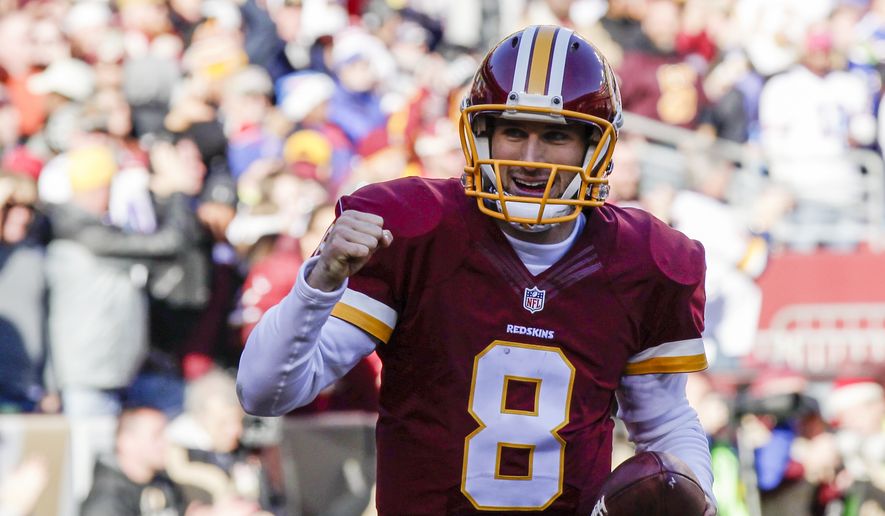To sign or not to sign? That’s the question.
The answer at this point: What’s the rush?
Washington and quarterback Kirk Cousins had an entire offseason to agree on a long-term contract. If they don’t come to terms by July 15, Cousins will play the upcoming season under the NFL’s franchise tag, forced to make due with a $19.95 million salary.
That sounds like a great deal for Cousins, a raise of about $19.25 million from last season.
No wonder he’s so nonchalant about the impasse in negotiations.
Pro Football Talk reports that the sides have given up on beating the deadline, content to ride out 2016 with a one-year deal. “Captain Kirk” fans might view that as a disappointment. They’re eager for Washington to end the quarterback search that dates to RFK Stadium’s glory days. In their minds, Cousins stated his case by leading a four-game win streak down the stretch as Washington unexpectedly reached the playoffs.
General manager Scot McCloughan has said all the right things about keeping Cousins in burgundy and gold for the foreseeable future. He assures everyone that the record-breaking QB wants to remain with the team and the feeling is mutual. It’s been a veritable lovefest.
Except at the negotiating table, where the clock hits 0:00 on Friday and resets after the 2016 season.
If that scenario is perfectly fine with McCloughan, that should suffice for Washington fans.
You can’t subscribe to “In Scot We Trust” while questioning his wait-and-see approach with Cousins. McCloughan wants to see an encore as much as anyone and he’s willing to pay for it after the fact — even if the price goes up.
“I’m OK with that,” McCloughan told Bleacher Report in April. “Let me overpay him if he’s good. If you have a productive guy (at quarterback), it helps everything and it proves out.”
Determining Cousins’ value was an impossible task this offseason, partly because he emerged from blah to play exceedingly well in the last eight games, and partly because the quarterback market is like the green blob growing uncontrollably in that Geico commercial. It’s somewhere between Andrew Luck (around $123 million in new money, $87 million guaranteed) and Brock Osweiler ($72 million, $37 million guaranteed).
For all the excitement Cousins generated during the second half of last season, he was barely serviceable in his NFL career prior to that. Opening as the full-time starter for the first time, he produced replacement-level numbers through the midway point: 10 touchdowns, nine interceptions, 6.3 yards per attempt and a 66.9 percent completion rate.
Washington has every reason to believe he’ll be closer to the QB it saw from then on: 19 touchdowns, two interceptions, 9.4 yards per attempt and a 73.9 percent completion rate. He has more experience in the system, more confidence in himself and more weapons around him.
But the sample size is too small to consider Cousins as “proven.” He’s still largely in the “unknown” category, even as owner of Washington’s single-season record for passing yardage (4,166).
History teaches us that quarterbacks can get hot for a spell but be in a deep freeze otherwise. McCloughan saw an example firsthand as a Seattle Seahawks executive. Matt Flynn shined when given opportunities as Aaron Rodgers’ backup in Green Bay — throwing for 480 yards and six touchdowns in his final game with the Packers. The Seahawks signed Flynn as a free agent and anointed him the starter, but rookie Russell Wilson won the job in training camp.
Washington rookie Nate Sudfeld is no threat to Cousins this season and neither is second-stringer Colt McCoy. Barring injury or regression to the “Oh no!” phase of his career, Cousins is assured of starting 16 games for only the second time in his five NFL seasons. The byproduct will form the basis for his next contract, which could pay him around $24 million in 2017 if he’s franchised a second time.
But that’s the price of doing business and McCloughan will pay it if Cousins comes close to replicating his 2015 numbers.
The last D.C. athlete to bet on himself like Cousins lost in humiliating fashion. Ian Desmond cost himself nearly $100 million when he spurned a lengthy deal with the Nationals and was forced to settle for $8 million from the Texas Rangers. There’s no such risk for Cousins; teams are desperate for signal-callers and he can fetch Osweilian money with even an average season.
He’s worth more to Washington than any other team, but that doesn’t mean McCloughan should offer a franchise-quarterback contract at the moment. If a reasonable deal can’t be reached by Friday, there’s plenty of time to revisit the issue next offseason.
One party will have a stronger argument then, but both will remain in position to make a long-term commitment as they see fit. They might as well let 2016 play out.
Neither side is going anywhere any time soon.
• Deron Snyder can be reached at deronsnyder@gmail.com.




Please read our comment policy before commenting.